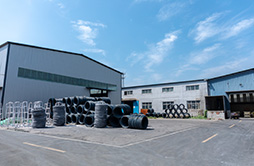galvanized nuts and bolts factory
Nov . 05, 2024 02:58 Back to list
galvanized nuts and bolts factory
A Comprehensive Overview of Galvanized Nuts and Bolts Manufacturing
In today’s industrial landscape, the necessity for durable and corrosion-resistant fastening solutions is more critical than ever. Galvanized nuts and bolts have emerged as a preferred choice across various sectors, thanks to their exceptional resistance to rust and environmental degradation. In this article, we delve into the intricacies of a galvanized nuts and bolts factory, shedding light on the manufacturing process, benefits of galvanized fasteners, and their varied applications.
Understanding Galvanization
Galvanization is the process of applying a protective zinc coating to iron or steel to prevent rusting. This is typically achieved through a hot-dip galvanization method, where the metal fasteners are immersed in molten zinc. The result is a robust layer of zinc that not only shields the underlying metal but also provides a significant increase in durability and longevity.
Manufacturing Process
1. Raw Material Preparation The first step in the manufacturing process is the procurement and preparation of raw materials. High-quality steel or iron is selected, based on the specific requirements for strength and application.
2. Shaping Once the raw materials are ready, they are shaped into nuts and bolts through processes such as forging or machining. Forging is particularly favored in high-strength applications due to its ability to improve the material's density and structure.
3. Thread Cutting After shaping, the next stage involves cutting threads into the bolts. This is a critical step that determines how well the bolts will fit into the corresponding nuts. Precision in this process ensures a secure fastening system.
4. Cleanliness and Surface Treatment Before galvanization can take place, the fasteners must be thoroughly cleaned to remove any dirt, grease, or rust. This is usually accomplished using pickling agents or abrasive techniques to ensure a smooth surface for the zinc coating to adhere to.
5. Galvanization The cleaned fasteners are then submerged in a bath of molten zinc, where the galvanization occurs. The temperature and duration of this immersion are carefully controlled to ensure an even and robust coating.
6. Cooling and Inspection After galvanization, the nuts and bolts are cooled, typically through air cooling or water quenching. This is followed by rigorous quality inspections to ensure they meet industry standards and specifications. Common inspection methods include visual checks, dimension verification, and testing for adherence of the zinc coating.
galvanized nuts and bolts factory

7. Packaging and Distribution Once inspected and approved, the products are packaged securely for distribution. It is essential that the packaging preserves the integrity of the fasteners, preventing any potential damage during transportation.
Benefits of Galvanized Fasteners
1. Corrosion Resistance The primary advantage of galvanized nuts and bolts is their exceptional resistance to corrosion, making them ideal for use in humid or harsh environments.
2. Durability The combination of zinc coating and high-quality materials results in fasteners that can withstand significant stress and wear, extending their lifespan.
3. Low Maintenance Galvanized fasteners require minimal maintenance, making them a cost-effective solution for both manufacturers and consumers.
4. Versatility With applications ranging from construction and automotive to marine and agriculture, galvanized nuts and bolts can be found in numerous industries, illustrating their versatility.
Applications
Galvanized nuts and bolts serve a multitude of functions across various industries. In the construction sector, they are critical for securing structural components in buildings and bridges. In automotive manufacturing, these fasteners play a vital role in assembling various parts of vehicles, ensuring safety and performance. Additionally, in agricultural equipment, they are used to withstand the rigors of outdoor conditions, contributing to the reliability of farming machinery.
Conclusion
The production of galvanized nuts and bolts is a critical aspect of modern manufacturing, providing reliable and durable fastening solutions across various sectors. By following a meticulous manufacturing process and employing high-quality materials, a galvanized nuts and bolts factory can deliver products that not only meet but exceed industry expectations. As industries continue to evolve, the demand for robust and corrosion-resistant hardware will only increase, cementing the importance of galvanized fasteners in our everyday lives.
Latest news
-
High-Quality Panel Stud Bolt Reliable Panel Stud Bolt Factory & Suppliers
NewsJul.08,2025
-
High-Precision Fine Thread Locknuts Manufacturer & Supplier Custom Solutions
NewsJul.08,2025
-
PH Imperial Stud Bolt – High Strength Fasteners from Leading Supplier & Factory
NewsJul.07,2025
-
High-Quality Allen Wrench Bolts Leading Factory, Company & Suppliers
NewsJul.07,2025
-
Wholesale Ball Stud Bolt - High Quality Supplier & Factory Price Reliable Wholesale Ball Stud Bolt Company
NewsJul.06,2025
-
High-Strength Alloy Bolts Manufacturer & Supplier Quality Alloy Fasteners Factory
NewsJul.06,2025
